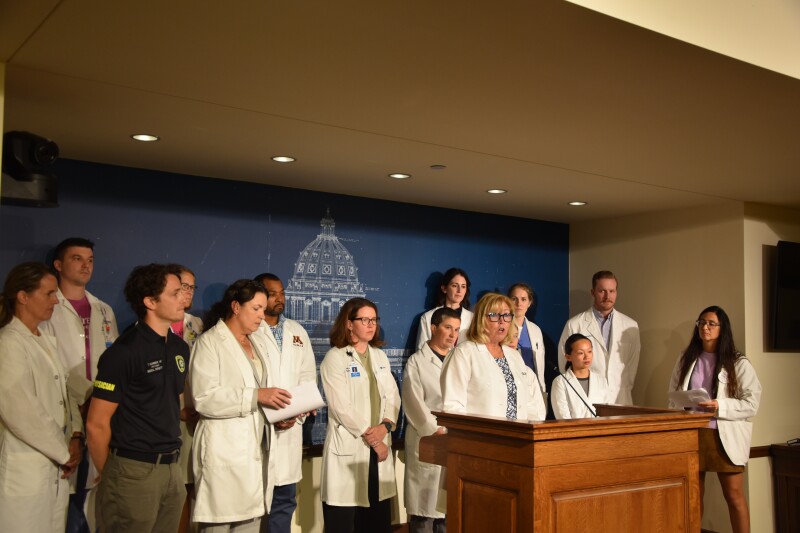
Health care leaders from across Minnesota convened at the State Capitol on Thursday to urge Governor Tim Walz to call a special legislative session aimed at advancing gun control measures. Their demands come in the wake of the devastating shooting at the Annunciation Catholic Church that occurred over a month ago, which left multiple victims needing urgent medical attention.
During a press conference, a coalition of doctors, including those who treated victims of the shooting, called for four specific gun control initiatives: a ban on assault weapons, a prohibition on high-capacity magazines, implementation of safe storage laws, and the repeal of local preemption laws that prevent cities from enacting their own gun regulations. Dr. Lisa Mattson, president of the Minnesota Medical Association, emphasized the gravity of the situation by stating, “This is no longer a friendly request from their local doctors. This is a demand from the tens of thousands of physicians across the state who know firearm violence for what it is: a public health crisis.”
Calls for Legislative Action and Political Stalemate
Despite ongoing discussions with lawmakers, the doctors did not disclose specific responses from officials regarding the delay in convening a special session. Dr. Janna Gewirtz O’Brien, president-elect of the Minnesota Chapter of the American Academy of Pediatrics, expressed frustration, stating, “I think sometimes politics gets in the way of good sense.”
Governor Walz, speaking at a separate event on the same day, acknowledged that he is “still working it” but stopped short of confirming any plans for a special session. Public negotiations regarding the session’s agenda have been contentious, with Democratic leaders reporting a “clear impasse.” A recent proposal from DFL leadership, which included various Republican suggestions on school safety and mental health, has been made public. However, Walz criticized the lack of gun control measures included in the Republicans’ counteroffer, emphasizing the need to address the full spectrum of issues related to public safety.
“If we’re going to come back in a special session and address what the public clearly wants, we need to discuss the whole spectrum of issues,” Walz stated. He expressed concern that yielding to Republican demands without addressing gun control would mirror political behavior observed at the federal level.
First-Hand Accounts from Medical Professionals
Dr. Trish Valusek, a pediatric trauma surgeon at Children’s Minnesota, recalled the traumatic experience of receiving a trauma alert the morning of the shooting. She noted that while she has treated children with gunshot wounds before, the scale of the incident was unprecedented. “Having five bloody shocked children arrive at Children’s all at once, all of whom were the same age as my children, is very difficult,” she shared.
Valusek highlighted the unique physiological challenges in treating pediatric patients, stating, “Kids aren’t just little adults. The saying certainly holds true for gunshot wounds.” She stressed the severity of injuries that children can sustain from gun violence, urging lawmakers to take decisive action.
Dr. Tim Kummer, the first physician on the scene, vividly described the chaos and trauma he witnessed. He has previously testified about the stark differences in injuries caused by handguns versus rifles. Kummer remarked that assault weapons significantly increased the number of injuries among children at the Annunciation shooting, turning what might have been minor injuries into life-threatening situations.
“For those who say gun violence is a complicated issue, it isn’t. This is a public health issue, and we know how to address public health issues. We follow the evidence,” Kummer stated.
He concluded by reiterating the need for legislative measures to limit access to certain types of firearms, emphasizing that such weapons lead to more severe injuries and trauma for victims and medical responders alike. “The evidence to this public health issue is clear: limit access to certain weapons, weapons that, by design, cause more victims, not less,” he added.
The call to action from Minnesota’s health care leaders underscores a growing urgency for legislative change in response to gun violence, reflecting a broader national conversation about public safety and health. As discussions continue, the fate of proposed gun control measures remains uncertain, while affected communities await decisive action from their leaders.






